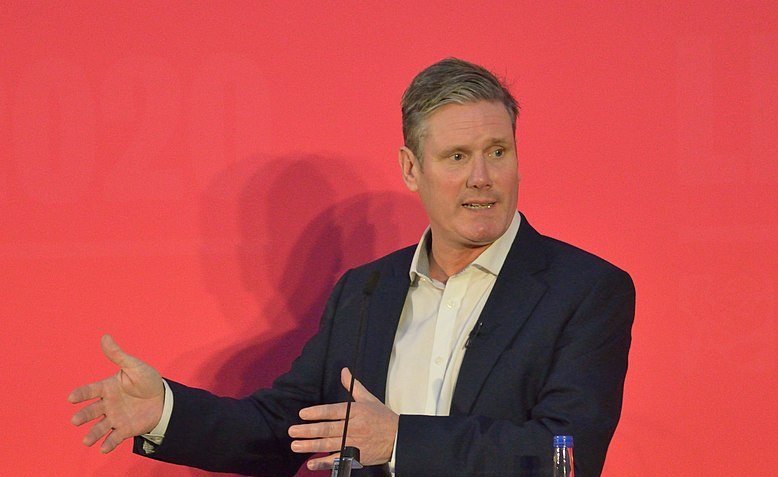 Keir Starmer, Photo: Rwendland / cropped from original / licensed under CC BY-SA 4.0
Keir Starmer, Photo: Rwendland / cropped from original / licensed under CC BY-SA 4.0
Preoccupied with burying the politics of the Corbyn era, Starmer’s vacuous leadership is failing to offer a coherent alternative to the Tories, argues Alex Snowdon.
Keir Starmer has had a rough couple of weeks. Polls have indicated a consistent Tory lead, with evidence of some Labour voters peeling off to either the Lib Dems or the Greens. The Labour leader is failing to make much of a dent in the political debate around exiting the pandemic.
Sympathetic media commentators have shown signs of dissatisfaction and erstwhile supporters have voiced concerns. A much-hyped speech on the economy this week fell flat. Labour was reduced to reproducing laughably banal quotes from the speech as social media memes – a triumph of vacuousness over substance.
Weak opposition
A number of things underpin these problems. The Tories face serious difficulties, but they have to some extent stabilised themselves as a result of the vaccine rollout proving a success. This has had little effect on poll ratings, but it has at least secured Boris Johnson’s position as prime minister.
The restless backbenchers may still cause trouble over lockdown, but they accept that Johnson will continue as Tory leader. This is in marked contrast to the feverish speculation in the autumn about how long Johnson could survive for. Serious tensions remain though.
Starmer has been unable to land punches on the Tories precisely because he focused excessively on ‘competence’ and ‘delivery’, while allowing the dominant framing to remain unchallenged. The government’s overall approach to the pandemic was beyond reproach. Any criticism had to be focused merely on details, with an emphasis on incompetent delivery.
That line of attack has been undermined by the vaccine rollout – which owes its success to being done properly through the NHS, not carved out to wealthy private sector friends of top Tories – going very well. But it’s noticeable that Labour isn’t taking advantage of the bad news stories that still afflict the Tories. Labour’s response to revelations about Tory cronyism yesterday – with a court ruling that Matt Hancock, health secretary, acted unlawfully by failing to publish multi-billion-pound Covid19 contracts – has been dismal.
Starmer has proved hopelessly incapable of making concrete demands in a timely manner. He has had a habit of calling for measures too late. He has seemed to be unwilling of taking a risk by calling for something before it has already become a near-certainty anyway. This has, quite reasonably, created an impression of weakness and vacillation.
No alternative
Not only has Starmer proved weak in opposing the government, but it has become increasingly clear that Starmer and his closest associates have very few ideas. This week’s much-heralded speech gestured in the direction of big ideas, but didn’t offer any. There was a recognition that large-scale social change is needed, but this wasn’t fleshed out with ideas about a Green New Deal, or large-scale public ownership, or transforming people’s working conditions, or anything else.
Rather than articulating an alternative to the Tories, the focus of Labour’s front bench has been on repudiating Corbynism. It has become more obvious lately that they do not, however, have anything resembling an alternative coherent worldview or policy platform to the Corbyn era.
This is in fact what underpins the directionless drift and lack of clout in Labour: Starmerism is defined, above all, by overturning the left-wing gains of the Corbyn era. This takes precedence over opposing the Tories or outlining an alternative.
The repudiation of Corbynism is happening at a rapid pace too. Starmer becomes Kinnock, Smith and Blair all rolled into one. What took 13 years from the election of Neil Kinnock as Labour leader to the first Blair election victory must be concentrated into four years at most.
This is the project of shifting Labour drastically rightwards, marginalising the left, and making Labour a safe Team B for the British ruling class. Last weekend the Sunday Times revealed the growing connections between Starmer’s team and key figures from the Blair regime, notably Peter Mandelson. This reeks of desperation and insecurity, but it also indicates how far to the right Starmer’s Labour is moving.
Starmer is not some sort of balancing act figure, occupying a centre ground inside the Labour Party between Left and Right. He is leading the shift to the right. He is instrumental in driving through the witch hunt of socialists as part of that.
Politics beyond parliament
Unsurprisingly, there is a lot of discontent on the Labour left. This is not being channelled effectively and it makes little difference to what happens inside the party. Starmer’s own position is secure, he has a very right-wing general secretary in David Evans, the left has no presence in the shadow cabinet, the union leaders are mostly acquiescent and there is a slim right-wing majority on the NEC.
The forthcoming elections operate as a disciplining mechanism on grassroots members as well as some left Labour MPs. It is evident that many left-wing members have either departed the party altogether or drifted into passivity.
It would be naive to think that the left can make serious headway inside Labour. Labour’s direction of travel is clear. Socialists’ efforts are more effectively focused on building extra-parliamentary movements, promoting solidarity with trade union struggles and articulating independent socialist politics.
Join Revolution! May Day weekender in London
The world is changing fast. From tariffs and trade wars to the continuing genocide in Gaza to Starmer’s austerity 2.0.
Revolution! on Saturday 3 – Sunday 4 May brings together leading activists and authors to discuss the key questions of the moment and chart a strategy for the left.

